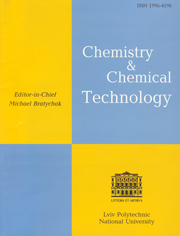Synthesis and Characterization of Organically Soluble and Electrically Conducting Acids Doped Polyaniline
| Attachment | Size |
|---|---|
| 203.88 KB |
[1] Roy B., Dutta Gupta M., Bhowmit L. and Ray J.: Synth. Met., 1999, 100, 233.
https://doi.org/10.1016/S0379-6779(98)01505-7
[2] Gabriel A., Gustavo M., Miras M. and Barbero G.: Synth.Met., 1998; 97; 233.
[3] Mercouri G., Kanatzids K.. et al.: J. Am. Chem. Soc., 2002, 122, 6629.
[4] Ito T., Shirakawa H. and Ilkeda S.: J. Polym. Sci., 1974, 12, 11.
https://doi.org/10.1002/pol.1974.170120102
[5] Ataman K. and Gupta N.: Polym. Sci., 1993, 1, 284.
[6] Roth S. and Graupner W.: Synth. Met., 1993, 57, 3626.
https://doi.org/10.1016/0379-6779(93)90487-H
[7] Wang Y., Hsu J. and Epstein A.: Synth. Met., 1993, 68, 207.
https://doi.org/10.1016/0379-6779(94)02304-H
[8] Mortimer R.: Mater. Chem, 1995, 5, 969.
https://doi.org/10.1039/JM9950500969
[9] Bergeron J. and Dao L.: Macromolecules, 1992, 2S, 3332.
https://doi.org/10.1021/ma00039a002
[10] Genies E. and Lapkowski M.: Synth. Met., 1988, 24, 61.
https://doi.org/10.1016/0379-6779(88)90595-4
[11] Pohl H. and Engelhardt E.: J. Phys. Chem.1962, 66, 2085.
https://doi.org/10.1021/j100817a004
[12] Chabukswar V. and Athawale A.: J. Appl. Polym. Sci., 2001, 79, 1994.
https://doi.org/10.1002/1097-4628(20010314)79:11<1994::AID-APP1007>3.0.CO;2-R
[13] Chabukswar V. and Athawale A.: Chem. & Chem. Techn., 2008, 2, 257.
[14] Chabukswar V., Sable G.: Chem. & Chem. Techn., 2009, 3, 95.










